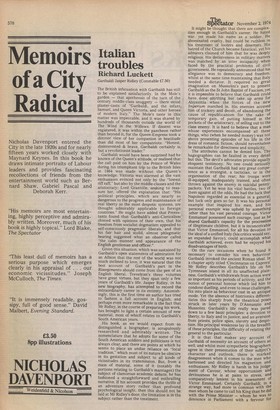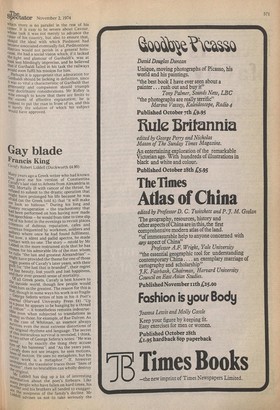Italian troubles
Richard Luckett
Garibaldi Jasper Ridley (Constable £7.50) The British infatuation with Garibaldi has still to be explained satisfactorily. In the Mole's garden — that apotheosis of the turn of the century middle-class snuggery — there stood plaster-casts of "Garibaldi, and the infant Samuel, and Queen Victoria, and other heroes of modern Italy." The Mole's taste in this matter was impeccable, and it was shared by
hundreds of thousands outside the world of The Wind in the Willows. If dissent was
registered, it was within the pantheon rather than beyond it, for the Queen-Empress took a dimmer view of her companion in beatitude than did most of her compatriots: "Honest, disinterested & brave, Garibaldi certainly is, but a revolutionist leader."
Garibaldi would have been surprised had he known of the Queen's attitude, or realised that the call paid on him by the Prince of Wales during his triumphant trip to the British Isles in 1864 was made without the Queen's knowledge. Victoria was alarmed at the vast enthusiasm evinced not only by the "lowest riff raff," but also by the middle-classes and the aristocracy; Lord Granville, seeking to reas sure her, offered the explanation that: "His political principles, which are nearly as dangerous to the progress and maintenance of real liberty as the most despotic systems, are thought admirably applicable to foreign countries.'' He might have added that Protes tants found that Garibaldi's anti-Clericalism chimed with opinions of their own, that his freedom from socialist dogmatism appealed to self-consciously pragmatic liberals, and that his fair hair and stolid, almost phlegmatic bearing suggested what an observer called "the calm manner and appearance of the English gentleman and officer."
Given this situation, which was sustained by Garibaldi's open statements of admiration for an Albion that the rest of the world was not much inclined to love, it was natural that the best account of Garibaldi's part in the Risorgimento should come from the pen of an English liberal. Trevelyan's three volumes have great virtues, but they span only a few years of Garibaldi's life. Jasper Ridley, in his new biography, has attempted to record the extraordinary career in its entirety. Astonish ingly, this is the first time an author has tried to fashion a full account in English; and perhaps even more remarkable is the fact that Mr Ridley, in the course of preparing his work, has brought to light a certain amount of new material, most of which relates to Garibaldi's South American years.
His book, as we would expect from so distinguished a biographer, is scrupulously researched and admirably written. The nomenclature that he adopts for some of the South American soldiers and politicians is not always clear, and there are points at which he seems to place an undue reliance on "local tradition," which must of its nature be obscure in its gestation and subject to all kinds of vicissitudes in its transmission. But, from a mass of material, some of it (notably the
portions relating to Garibaldi's marriages) the subject of clamorous academic debate, he has fashioned a straightforward and enthralling narrative. If his account provides the thrills of an adventure story rather than profound psychological insight, then this should not be laid at Mr Ridley's door; the limitation is in the subject rather than the treatment. It might be thought that there are complexities enough in Garibaldi's career. He hated war, yet made his name as a soldier. He abominated cruelty, but could be ruthless in his treatment of looters and deserters. His hatred of the Church became fanatical, yet his admirers claimed of him that he was deeply religious. His decisiveness in military matters was matched by an utter incapacity when faced by the practical problems of civil government. He repeatedly announced that his allegiance was to democracy and freedom, whilst at the same time maintaining that Italy needed a dictator. It required no great imagination on Mussolini's part to present Garibaldi as the St John Baptist of Fascism, Yet it is impossible to believe that Garibaldi could have done anything but take up arms for Abyssinia when the forces of the new Imperium marched in. His enemies accused him of trickery and deceit, of abandoning the cause of republicanism for the sake of temporary gain, of putting himself in the pockets of the aristocracy, of selling out to the class enemy. It is hard to believe that a man whose experiences encompassed all these things, who (when he needed money) was not above presenting episodes of his life in the dress of romantic fiction, should nevertheless be remarkable for directness and simplicity.
The attributes cannot be denied him. The hagiographies can be faulted in every detail but this. The devil's advocates provide equally eloquent testimony. No one could seriously maintain that Garibaldi had any great competence as a strategist, a tactician, or in the organisation of the rear; his troops were ill-equipped, inadequately trained, and often thrown against the enemy in suicidal penny
packets. Yet he won his vital battles, two of them against all the odds. He had the luck that Napoleon regarded as essential in a general, but luck only goes so far. It was his personal example that inspired his men, and his personal example was upheld by something other than his vast personal courage. Victor Emmanuel possessed such courage, just as .he shared Garibaldi's capacity for the procreation of illegitimate children, but it is inconceivable that Victor Emmanuel, for all his devotion to the ideal of a unified Italy (his critics would say, an expanded Savoy), could accomplish what Garibaldi achieved, even had he enjoyed his disadvantages of birth. On the rare occasions when he found it necessary to consider his own behaviour Garibaldi invoked the ancient Roman ideal. Ifl a chapter aptly titled 'Cincinnatus on Caprera. Mr Ridley describes Garibaldi's life on his Tyrennean island in all its unaffected plainness. Garibaldi's withdrawals from action were as important as his periods of activity, and the notion of personal honour which led him to condone duelling, and even to issue challenges, fits into place as behaviour cast in an antique mode. Yet the absence of histrionics differentiates this sharply from the theatrical poses struck in later years by D'Annunzio and Mussolini. Garibaldi's life really was pared down to a few basic principles: a devotion to liberty, to Italy and to justice, and an aversion from priests, police spies, slavery and despotism. His principal weakness lay in the breadth of these principles, the difficulty of relating the general to the particular.
It is that that makes any account of Garibaldi of necessity an account of others as well, and whilst most sympathetic biographers agree in their presentation of their subject's character and outlook, there is marked disagreement when it comes to the men who harnessed and directed his magnetism and
enthusiasm. Mr Ridley is harsh in his judgement of Cavour, whose opportunism and deviousness he is at pains to stress, and comparatively lenient in his assessment of Victor Emmanuel. Certainly Garibaldi, in a strange way, had more in common with the man whom he came to call his King than he did with the Prime Minister — whom he was to denounce in Parliament with a fervour for
Which there is no parallel in the rest of his career. It is easy to be severe about Cavour, Whose task it was not merely to advance the cause of his country, but also to ensure that, should the ideal with which Piedmont had !:.'ecome associated eventually fail, Piedmontese liberties would not perish in a general holocaust. He had a social vision which, if it lacked the light and glamour of Garibaldi's, was at least less blindingly imprecise, and he believed that if Garibaldi failed in his task the railways Would soon fulfil his mission for him.
Perhaps it is appropriate that admiration tor G. aribaldi should be lacking in definition, since It was so vital a characteristic of Garibaldi that generosity and compassion should triumph over doctrinaire considerations. Mr Ridley is ‘Ylse enough to know that there are limits to the extent of effective explanation; he is Fontent to put the man in front of us, and this Is surely the solution of which his subject would have approved.



































 Previous page
Previous page